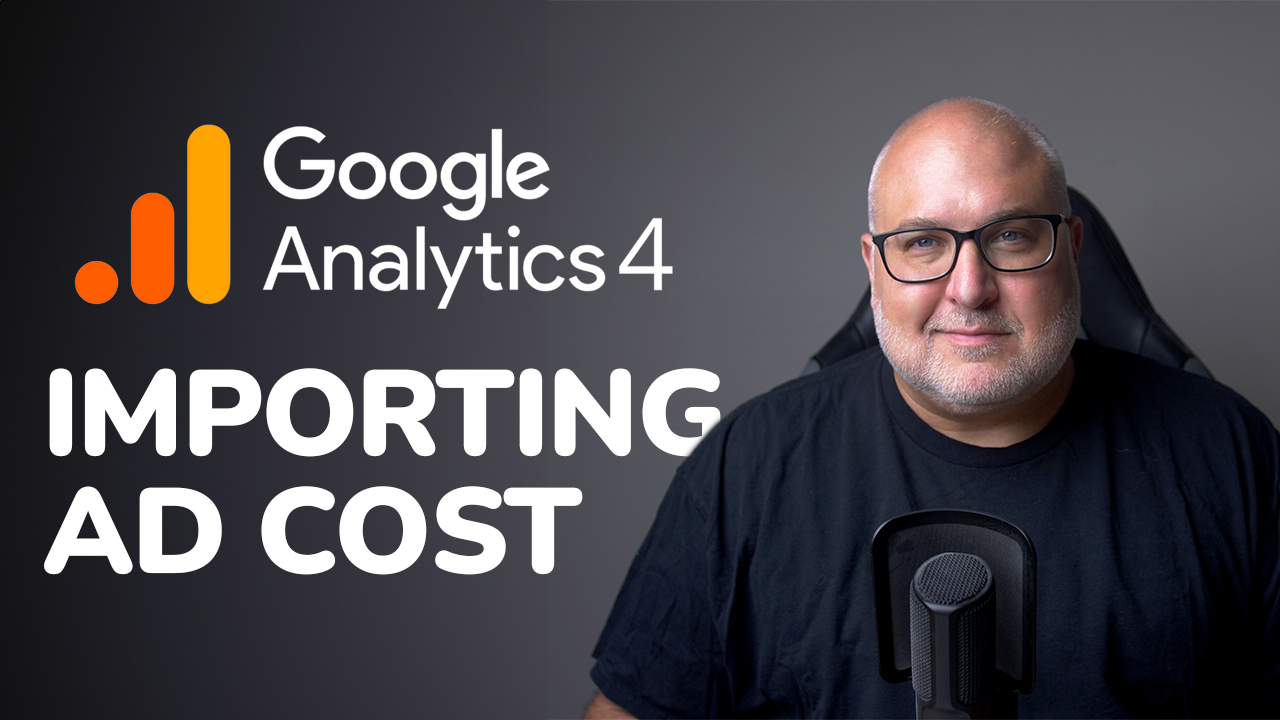Marketing Horror Stories
Roy Bielewicz
Beware: These may keep you up at night.
Halloween is fast approaching, so we take a look at some marketing horror stories that might just keep you awake at night. From marketing teams that aren't allowed to see their analytics, to a PR nightmare that has 25,000 members of an "I Hate" your company Facebook group.
Transcription:
[00:00:00] Hey! If you've been involved in marketing for any period of time, you've probably got horror stories of your own. For a little fun for Halloween, we're going to talk about horror stories that I've seen. I'm sure you've seen similar ones. Let's talk about what you shouldn't be doing in marketing and how horrific it can just be.
[00:00:28] All right, I'm going to share some of the marketing horror stories that I've seen in the past, which are a lot because I'm old. I'm sure you have some as well. Now, these examples that I'm going to give are not current clients, just so that my clients know, but they are companies I've worked with in the past; either for the companies or as a consultant.
[00:00:52] Names are not going to be mentioned. We're going to kind of use different examples that will hide the identities and protect the innocent or the guilty as it were but let's jump right in. One of the most probably dysfunctional, marketing programs I've ever been involved with was a mid-sized e-commerce company.
[00:01:18] I'm going to say that they produce as an example, plumbing supplies. That was not it but again, to protect the innocent. When I first started working with them they had a marketing team, quote-unquote, of about 10 to 15 people. It largely consisted of photographers and designers, and the only thing that these people worked on was taking products, photos of products, and then creating, manually, creating emails, and that's it.
[00:01:57] That's all they did. They had a team of over 10 people that only worked on sending out emails. The horror part of it is that nobody had any clue whether these emails were actually working. Nobody on the marketing team, and this is still crazy to me to this day, ever saw any data. Never. The owners of the company, they were the previous owners of the company, they were still running it even though the company had been sold. The owners of the company were so paranoid about anybody knowing any of their information that their own marketing team didn't know any key metrics about their email program. They were just doers, and so you had a whole team of people just sitting there.
[00:02:49] Producing emails and they didn't know whether the open rates were good. They didn't know how much revenue it was driving. They didn't know any of that information. The only task that this whole marketing team did was generate emails. It's because they had, it's always what they had done. They got to a good size as a company with just organic search and sending emails. So it was part of their process that whenever they got a new part in or a new product, they would take pictures, and then an email would go out. Now, keep that in mind. This is a company with thousands and thousands of products, and if a bolt came in, it was a new bolt for a new kind of part because it was their process they would take a photo of the bolt and then dedicate an entire email to that bolt that would then go out to a list that was kind of segmented, but not really.
[00:03:49] With no consideration of did anybody care about that bolt? That individual bolt, did it deserve a whole email? And no, nobody was thinking about it. So the email program was just awful, and these poor guys on this team were just manually creating these emails.
[00:04:11] They didn't even have a good email program. It was really antiquated to produce any kind of templates or to do any kind of dynamic emails. The whole concept of sending out a campaign that might include in it like multiple products from a category was baffling to them. They just didn't do it.
[00:04:31] It was a painful process to try to communicate that to the previous owners to help them understand that just because they were successful up to this point doing that, that there was no way that they could grow the program by just keeping to send emails because they were just hemorrhaging subscribers because they would get, in some cases, 10 emails a day.
[00:04:57] If you were on a certain specific list, you might get 10 emails, some of which were literally about a bolt. I mean, if that doesn't make you scream and kind of shake and want to sit in a corner and rock back and forth, which I think I may have done in my office a few times. So that was their email program.
[00:05:19] Now, there's many other horror stories from this company. The marketing team was not allowed to chat with each other on any kind of chat functionality like Slack or anything like that because it couldn't be monitored. They had, again, no insight into what was going on in the company.
[00:05:37] There was no idea of adding any kind of value to what they were doing. So it was pretty horrific. At the end of the day, I don't know that I need to say this, but it's kind of important for your marketing team to have access to data. And okay, maybe you don't want to let them in on all of the secrets for strategic stuff.
[00:06:01] Because if you're in a very sensitive industry or a very competitive industry, I get having some stuff that is sensitive but understanding how the program that they're supposed to be working on is working, whether it's actually driving more sales, if what the open rates are, what the subscriber rates are, what the engagement rates, all of those things that are kind of like mandatory for most marketing programs we're completely missing from this program.
[00:06:28] So if you're in a company that is not allowing the marketers to see data, flee, flee quickly. All right. Horror story number two. I worked with a client who had a build cycle for their website that they only released changes to the website quarterly, so it didn't matter what the change to the website was. If there was anything to do with the website, it had to go through a rigorous testing process, a rigorous development process, which is all good, but they would not release changes until it went through this very rigid process except every quarter.
[00:07:18] It didn't matter if something was broken, didn't matter if there was extremely important changes that would affect their business. They would not do it. This was problematic. One reason, this is a horror story and by the way, this was a major retailer. This was a major retailer of supplies and again, I won't name them, but they were big.
[00:07:44] We discovered that there was some elements in their shopping cart that was broken and it literally was costing them millions of dollars a day to not fix this. Yet, even though the code was changed, the code was fixed, the very rigid process they had of not releasing it was so bad that they lost money until the quarter rolled around and they finally released that.
[00:08:16] If you're ever in that situation again, probably not a win-win situation for you. You're going to want to not work for a company with such rigid, rigid release dates. It is one of the reasons why sometimes smaller retails can really catch up to larger BMFs of the industry, because they are nimble.
[00:08:43] You can make quick changes if you're a small retailer. You can completely change your business model overnight. You can add new products. You can do a lot of things that very large companies can't do because it literally takes them months to push stuff through. I've worked with clients who have even all their marketing programs they're all done. Six months to a year in advance. It's all scheduled. It's all scheduled on the website; the offers and the discounts, all that kind of stuff that you're seeing on the site that was done months ago. To be nimble and react to changes in the industry is often very difficult for larger retailers and companies to do because they just don't have the flexibility.
[00:09:31] Whereas a smaller retailer could definitely be nipping at their heels because they do have that flexibility. All right, another similar situation with a shopping cart and this was a large watch retailer manufacturer. A company that I knew was working on their checkout process and they had ostensibly improved the checkout process, but sales were going down.
[00:10:02] We took a look at their analytics and I specifically was involved in this project looking at their data and one of the things that we noticed was there seemed to be a lot of consistent numbers of people adding stuff to the shopping cart, but certain regions were having a higher rate of not completing their shopping process, not completing the purchase.
[00:10:29] And so we did some testing and what we found was that certain zip codes, even if it was a valid zip code, was getting kicked out of the shopping cart. It was identified as not valid so it was firing an error in the shopping cart as if it was blank or just a wrong zip code.
[00:10:46] The validation process was not working correctly for specific zip codes, it wasn't all of them. What that meant was that certain regions literally could not purchase. How this wasn't tested or found during the testing process before it was launched, I don't know. But we were able to see in the live data that if you came from zip code X, that there was physically no way you could actually purchase online.
[00:11:19] Through the art of investigative analytics, we were able to find out that the developers had essentially broken the site. That's something you never want to hear. I don't think the company was very happy. So that ended up, I think, being a bit of a horror story for all of the people involved.
[00:11:44] Another marketing horror story that we found, I was involved with a team of people that was working on a very large account and we were handling paid search. One of the people on the team, let's just say that he was using his computer for some things that were not sanctioned for computer, for company use and somehow he got hacked. So his computer was compromised. He didn't realize it. He had the passwords and access to this company's paid search program. Well, because he had that access, now the hackers had that access. So we got, received frantic phone calls from the client that their budget was being spent for paid search, which was an exceptionally large budget, was being spent in a day.
[00:12:39] It was a month's budget or something like that, gone in a day. And what we found out happened, and I can laugh now because it seems funny, but at the time it was not funny. What we found out happened is the hacker went in and decided to change the bids on the paid search program to like a thousand dollars per click.
[00:13:01] They weren't paying a thousand dollars per click, but they were paying whatever the maximum was per click. They blew through a month's budget in essentially a day and it just is a great example of why you need to be careful with your passwords. You shouldn't be opening stuff on a company computer that could put you at risk and essentially put the company at risk for a lawsuit and or losing a very valuable client. So they were not happy, rightfully so. I think that resource learned a very valuable lesson that day.
[00:13:41] I don't know if this one counts as a horror, a marketing horror story, or just an employment horror story. I was working for a company that I mentioned earlier and they had designed a new office for me and so I was meeting with my team, all of the people that were manually creating emails all day long without knowing how they worked, and I was trying to meet with my team and my computer monitor was consistently in the way of the office. I had asked if I could have the maintenance team kind of turn the desk because of the way the plugs were and all that kind of stuff. I was told by one of the maintenance team that, no, I couldn't move it or they couldn't move it for me.
[00:14:37] So I was like, well, why can't you move my desk? I mean, I literally can't see the people that are sitting across from me because of the way it's positioned. The answer was that the cameras that were installed in my office would not be able to see what I was doing on my monitor while I was working. So that was interesting. I didn't realize that there were cameras pointed at my monitor and after further inquiry, apparently, every office in the company and most people weren't aware of this; that they were all being secretly filmed and not just them, but whatever they were looking at on their monitor. Apparently, this company didn't realize that you can use software at a company to actually see what people are looking at on their computers without physical cameras. It is a bit of a violation of privacy and definitely creepy to know that that was the case. We did find that that company actually had cameras everywhere. Including in certain areas of the place that you wouldn't expect.
[00:15:52] They claimed that they weren't in the bathrooms, but there was some question as to whether that was true. That was a company that I then quickly left because if I'm sorry but if you don't have trust in your executives, much less your employees, and you need to film everything that they're doing, I don't know that I want to work there. It definitely was a horrific experience.
[00:16:18] Another example of a horror story for marketing was a company I worked with that had developed their own e-commerce system. The system was homegrown and it was built on an Access database. For those of you who may not remember Microsoft used to have Microsoft Access. It was part of your office suite of tools, just like Microsoft Word. Access was a simple database that you could run, SQL, SE, SQL queries and that type of thing on. It was an early version of more sophisticated databases. Now people might be more familiar with other databases.
[00:17:06] There's databases in the cloud. There's Google's big query. There's MyQ, which is an open-source database but at the time when they created the e-commerce system, they decided to use Access. Well, the problem with that is that Access actually has a data limit. Most people don't realize that, but so does Excel.
[00:17:32] Or at least some of the older versions of Excel had more discreet data limits. So Access could only do a certain number of records. The problem was that they had so many parts, so many transactions, that they reached their limit. They didn't know that they reached the limit and so the site crashed; their entire system crashed.
[00:17:58] Their ordering system, the website, their client database, their custom employee database. It was all built off this system and it just went kaput. There was no orders able to be taken in or processed, or fulfilled or anything until they actually created a new database and were actually able to transfer some stuff over.
[00:18:29] They lost a bunch of stuff. They lost records. They lost customer data, they lost order stuff. They lost inventory. It was one of the first true examples that I experienced of why you shouldn't, probably in this day and age, try to build your own e-commerce system. There are just so many good commerce systems on the market that are either open source or that are a SaaS models, so you don't have to worry about hosting them.
[00:19:02] They've worked out a lot of the bugs already. You know, there are very few instances I can think ofhwhere it would behoove a company to build it from the ground up. To just say, hey, you know what? We're going to ignore the last 15, 20 years of experience that some of these e-commerce companies have had, integrating other third-party products and making it just a complete commerce system, let's ignore that and just build it ourselves.
[00:19:32] That's just not a good decision and it's just going to be a lot of work and a huge investment. I have yet to see a compelling reason why you would do that. This was a great first example of that. There was all sorts of problems with this system.
[00:19:48] Inherently, like it didn't have a built-in content management system. It didn't have a lot of stuff that you would think was just easy to manage or that is out of the box for most e-commerce systems. Then obviously, if you're built on a house of sand where you know your data's going to take a dive at any point, like obviously that's problematic.
[00:20:13] That was a big dramatic loss for that company and was a great example of you probably should do some due diligence and not just stick with the systems that you have because eventually, you're going to outgrow them. Another example of a marketing horror story is, PR can really be detrimental.
[00:20:39] The one instance I'm thinking of that was just absolutely horrific is, a company I was working with, they had become known in the industry for not delivering products on time. They had an inventory and availability status on the website. So it'd say ships in two days, five in stock, stuff that we're used to seeing. You're used to seeing like, hey, this stuff is in stock, it's available. I'm going to order it. Right? It’s not rocket science.
[00:21:13] Well, those numbers were never right. So they became notorious for somebody ordering something and in some cases, even if they needed it badly, paying for expedited delivery. They might pay 50 to a hundred dollars to get it next day or two-day shipping.
[00:21:37] The company allowed them to order it. Then they would get an email in two or three days saying, hey, it's delayed. These delays then turn into months and in some cases, years. The company would not always refund the money because they would claim like, hey, it's on the way, it's already been ordered. It's coming from the warehouse.
[00:22:00] So anecdotally customers were saying, hey, I've reached out to you five, 10 times. I'm told that it's coming, that it's just going to be a couple more days and I still have not received it. So after six months of the runaround of them not receiving it, they get a little angry.
[00:22:24] Justifiably so. Well, the horror story part of this is obviously that's just not a good way to treat your customers and you lose a lot of customers that way. The horror story part of this is that people took it upon themselves to start a hate group on Facebook and usually those peter out after a while.
[00:22:51] You see that sometimes, right? Where something will rile people up and they'll start like a hashtag going around or they'll try to boycott somebody. But this company has been so consistently bad in its delivery and its execution of order delivery and management of orders and customer interaction and customer service. That the group, I just looked it’s still active and it has over 25,000 members in that Facebook group. So there's 25,000 people that took it upon themselves to join this group to talk about how much they hate this company. I don't know how you operate and I know the company had taken efforts to kind of get involved and they actually had their customer service people monitoring posts and stuff so that they could respond.
[00:23:52] I don't know if you've ever been involved in Reddit or any of those forums, but when people are angry and it's a mob kind of mentality, I feel bad for the customer service person that's actually responding to those because they hate you. No matter what response you have, no matter how professional you are, they're just going to trash you and they're going to give you a lot of hate.
[00:24:17] They tried doing that for a while. I don't know that the company is actively trying to respond to those posts anymore, but I haven't really kept up to date on it but yeah so that's a PR nightmare. It actually had made some press where in some of the industry magazines and that type of thing they actually talked about the hate and how many people actively hated this company.
[00:24:50] So that's something you never want to have happen to your company; is having your hate group have more followers than some of your active social media accounts that you're hoping to promote your company on. These are just a few of the horror stories, marketing horror stories, that come to mind.
[00:25:11] I'm sure I could think of a lot more but I would love to hear your horror stories as well. So if you have some, please send them over. If you're listening to this on a podcast, you can leave some comments, on Spotify and stuff like that and we'll try to respond to them. Obviously, if you're seeing this on YouTube, leave comments below.
[00:25:31] And if you are on YouTube, please give us a thumbs up. It helps us get our videos out there and hopefully, you'd want to subscribe cause we're going to be doing a lot more content over the next few weeks and coming months. We'd love you to take part in that. So thanks for joining and again, I would love to hear some of your horror stories as we head into Halloween and maybe share them in an upcoming video as well.
[00:25:56] So have a great one. Thanks.
Contact Us





